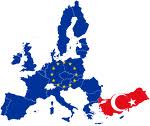 The Turkish-Brazilian brokered fuel swap deal with Iran, and the following “no” to further Iran sanctions, has been the object of much analysis in the past month. Reoccurring themes to these analyses were the ‘rising power’ aspects of the Turkish-Brazilian diplomacy, and of course, whether these developments demonstrated that Turkey has tired of the West, and is instead turning East to fulfill its international aspirations.
The Turkish-Brazilian brokered fuel swap deal with Iran, and the following “no” to further Iran sanctions, has been the object of much analysis in the past month. Reoccurring themes to these analyses were the ‘rising power’ aspects of the Turkish-Brazilian diplomacy, and of course, whether these developments demonstrated that Turkey has tired of the West, and is instead turning East to fulfill its international aspirations.
The perceived eastward drift of Turkey was brought to the forefront in the wake of the disastrous Gaza flotilla raid. The raid caused the Turks to freeze diplomatic ties with Israel and halt a military cooperation of 15 years with Tel Aviv. Although these dramatic events have put a spotlight on Turkey’s relationship with the West, the EU’s reluctance to grant the Turks membership (a process started in 2005) has proven that the current friction is about more than different strategies on Iran and a raid gone horribly wrong.
Obviously, Turkey is a vital partner to the West. The only Muslim nation in NATO situated in a volatile region where the West is none to popular. The value of Turkey as an ally can hardly be underestimated. As former German foreign minister Joschka Fischer recently wrote in an opinion piece:
Turkey is situated in a highly sensitive geopolitical location, particularly where Europe’s security is concerned. The eastern Mediterranean, the Aegean, the western Balkans, the Caspian region and the southern Caucasus, Central Asia, and the Middle East are all areas where the West will achieve nothing or very little without Turkey’s support. And this is true in terms not only of security policy, but also of energy policy if you’re looking for alternatives to Europe’s growing reliance on Russian energy supplies.
Considering the importance of Turkey to Western interests it is unsurprising that the country with most on the line in the region (in the immediate sense at least), the US, reacted most strongly to the perceived estrangement of Turkey. Secretary of Defense Gates made his thoughts all to clear, stating that: “I personally think that if there is anything to the notion that Turkey is, if you will, moving eastward, it is, in my view, in no small part because it was pushed, and pushed by some in Europe refusing to give Turkey the kind of organic link to the West that Turkey sought.”
Obama reiterated this opinion, albeit using more diplomatic terms, in an interview with Italian media on July 8, stating that the EU has pushed Ankara to “look elsewhere.”
In what can best be viewed as an attempt to prove the US wrong, the EU has opened one more of the 35 policy chapters Turkey is required to fulfill to obtain EU membership. The policy chapter covers the uncontroversial issues of food and veterinary safety. Nevertheless, EU’s enlargement commissioner Stefan Fuele reassured the Turks of the EU’s commitment to admission process, and called the food safety chapter a “heavy weight chapter.” To date, only one policy chapter has been opened and closed, while 13 have been opened. Eight chapters remain blocked, as Turkey refuses to open its borders to EU member Cyprus.
The EU’s initiative on opening the new chapter, although cautious, is welcomed by this blogger. Hopefully it will be the harbinger of further initiatives. The Belgium presidency has declared that it intends to open more chapters, singling out energy and education as the next areas of negotiation. Considering the current concerns regarding the future of Turkey the Belgium presidency seems to stand a good chance of overcoming the French and German resistance on Turkish accession. The EU cannot afford to participate in a self-fulfilling prophecy, where the Turks are barred admission due to concerns of the incompatibility of the EU with (Muslim) Turkey. If this proves to be the case, Turkey will, as Obama pointed out, have no choice but to seek its future elsewhere. In doing so, an enormous bridge building opportunity would be lost.